

Online Guides: Time Management. This guide; explains the importance of good time management while studying; describes why and how to plan; and how to become an effective planner.
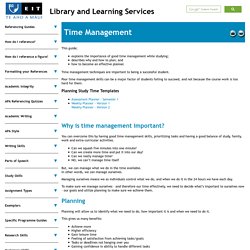
Time management techniques are important to being a successful student. Poor time management skills can be a major factor of students failing to succeed, and not because the course work is too hard for them. Planning Study Time Templates Why is time management important? Managing Your Time. Many students discover the need to develop or hone their time management skills when they arrive at college.
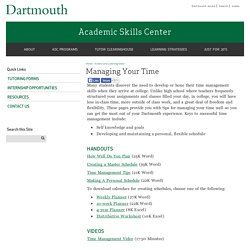
Unlike high school where teachers frequently structured your assignments and classes filled your day, in college, you will have less in-class time, more outside of class work, and a great deal of freedom and flexibility. These pages provide you with tips for managing your time well so you can get the most out of your Dartmouth experience. Keys to successful time management include: Self knowledge and goalsDeveloping and maintaining a personal, flexible schedule. TmLessonPlan. Untitled.
Lesson%20Plan%20 %20Time%20Management. Printable Time Management Lesson Plan Series. Home › Time Management for Teachers › Time Management Lesson Plan Looking for a lesson plan on managing time?
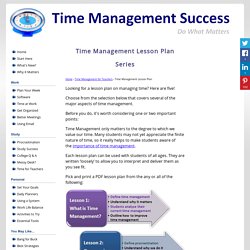
Here are five! Choose from the selection below that covers several of the major aspects of time management. Before you do, it's worth considering one or two important points: Time Management only matters to the degree to which we value our time. Handbook for Information Literacy Teaching. Welcome to the Handbook for Information Literacy Teaching (HILT).
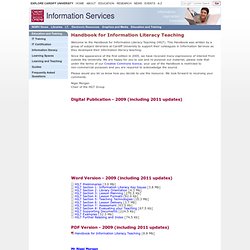
This Handbook was written by a group of subject librarians at Cardiff University to support their colleagues in Information Services as they developed their information literacy teaching. Since the appearance of the first edition in 2005, we have received many expressions of interest from outside the University. We are happy for you to use and re-purpose our material; please note that under the terms of our Creative Commons licence, your use of the Handbook is restricted to non-commercial purposes and you are required to acknowledge the source. Teaching Information Literacy Skills. Information%20literacy%20skills. Information Literacy Competency Standards for Higher Education. The Information Literacy Competency Standards for Higher Education (originally approved in 2000) were rescinded by the ACRL Board of Directors on June 25, 2016, at the 2016 ALA Annual Conference in Orlando, Florida, which means they are no longer in force.
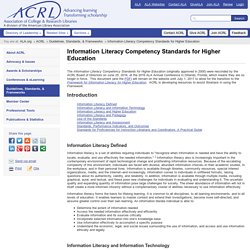
This document (and the PDF) will remain on the website until July 1, 2017 to allow for the transition to the Framework for Information Literacy for Higher Education. ACRL is developing resources to assist librarians in using the Framework. HowToWriteProposal. Writing a Research Proposal. What is a proposal?
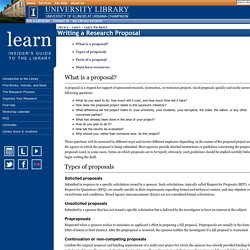
A proposal is a request for support of sponsored research, instruction, or extension projects. Good proposals quickly and easily answer the following questions: What do you want to do, how much will it cost, and how much time will it take? How does the proposed project relate to the sponsor's interests? What difference will the project make to: your university, your students, your discipline, the state, the nation, or any other concerned parties? Guidelines on writing a research proposal. By Matthew McGranaghan This is a work in progress, intended to organize my thoughts on the process of formulating a proposal.

If you have any thoughts on the contents, or on the notion of making this available to students, please share them with me. Thanks. Introduction. What Is My Learning Style - Learning Style Test 1. Multiple Intelligences Self-Assessment. Multiple Intelligences. Birmingham Grid for Learning - Multiple Intelligences (Secondary) The VARK Questionnaire. Teaching Adolescents How to Evaluate the Quality of Online Information.
An essential part of online research is the ability to critically evaluate information. This includes the ability to assess its level of accuracy, reliability, and bias. In 2012, my colleagues and I assessed 770 seventh graders in two states to study these areas, and the results definitely got our attention. Unfortunately, over 70 percent of the students’ responses suggested that: Middle school students are more concerned with content relevance than with credibility They rarely attend to source features such as author, venue, or publication type to evaluate reliability and author perspective When they do refer to source features in their explanations, their judgments are often vague, superficial, and lacking in reasoned justification.
Critical Thinking Lessons. Resources and Downloads for Teaching Critical Thinking. Tips for downloading: PDF files can be viewed on a wide variety of platforms -- both as a browser plug-in or a stand-alone application -- with Adobe's free Acrobat Reader program.
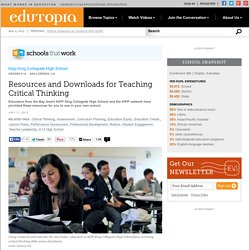
Click here to download the latest version of Adobe Reader. Critical Thinking Lesson Plans. The 5 Step Model to Teach Students Critical Thinking Skills. How To Teach All Students To Think Critically. All first year students at the University of Technology Sydney could soon be required to take a compulsory maths course in an attempt to give them some numerical thinking skills.
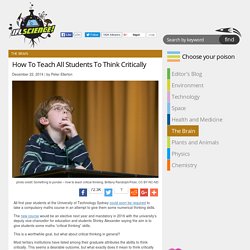
The new course would be an elective next year and mandatory in 2016 with the university’s deputy vice-chancellor for education and students Shirley Alexander saying the aim is to give students some maths “critical thinking” skills. This is a worthwhile goal, but what about critical thinking in general? 25 Question Stems Framed Around Bloom's Taxonomy. 25 Question Stems Framed Around Bloom’s Taxonomy While critical thinking is a foundation rather than a brick, how you build that foundation depends on the learning process itself: exposing students to new thinking and promoting interaction with that thinking in a gradual release of responsibility approach.
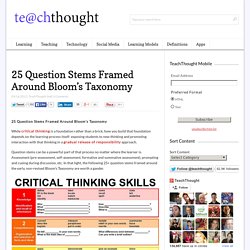
Question stems can be a powerful part of that process no matter where the learner is. Assessment (pre-assessment, self-assessment, formative and summative assessment), prompting and cueing during discussion, etc. Oral-presentations.pdf. Presentation-lesson-plan.pdf. Study Guides. ProfessionalDevelopmentLessonPlans.pdf. 27-case-study.pdf. Writing forCollege. Chapter 49: CASE STUDY What is a "case study" and what are its uses?
Introduction: What Is a Case Study? Two Formal Patterns for Case Studies Informal Patterns: Observing and Profiling. Write - Writing a case study response. What is a case study ? A case study is a description of a real life problem or situation which requires you to analyse the main issues involved. These issues need to be discussed and related to the academic literature and/or research findings on the topic and conclusions then drawn about why the situation occurred and how best to respond to it. Why do we write case study responses? Writing-a-case-study.pdf. Guidelines%20for%20Writing%20a%20Case%20Study%20Analysis.pdf. Write - Reflective writing. What is reflective writing? Good reflective writing usually involves four key elements: reporting and responding to a critical issue or experience; relating this issue or experience to your own knowledge in this field; reasoning about causes and effects of this issue/experience according to relevant theories or literature and/or similarities or differences with other experiences you've had; and reconstructing your thinking to plan new ways to approach the issue or engage in similar experiences in the future For more detail, see the 4Rs framework [130KB].
Why do we write reflectively? Online Guides: Descriptive, Analytical, Critical/Evaluative, Reflective Writing Compared. How do I Make my Writing Descriptive, Analytical, Critical/Evaluative or Reflective? Assignment instructions outline how to address an assignment topic and indicate which of the following writing styles is expected. The following model shows questions you need to ask of your research to help you think and then write in the appropriate style. Genres in Academic Writing: Reflective writing. Reflective-writing-guidance.pdf. Reflective Reports – how to write 1st class reflective reports. Using-gibbs-reflective-cycle-in-coursework.pdf. Reflective_writing_151211_copy1.pdf. APA Referencing @ EIT. APA Style. BibMe. Plagiarism.org - Best Practices for Ensuring Originality in Written Work. Turnitin - Originality Check, Online Grading & Peer Review.
Cornell%20Notes%20Lesson%20Plan.pdf. Lesson%20Plan%20for%20Note%20Taking1.pdf. Back to Basics: Perfect Your Note-Taking Techniques.